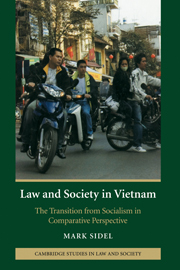Book contents
- Frontmatter
- Contents
- List of tables
- Acknowledgements
- Introduction
- Chapter 1 Constitutionalism and the emergence of constitutional dialogue in Vietnam
- Chapter 2 The emerging debate over constitutional review and enforcement in Vietnam
- Chapter 3 Motorbike constitutionalism: The emergence of constitutional claims in Vietnam
- Chapter 4 Economic law in the service of globalization: Labor law and labor export from Vietnam
- Chapter 5 Law, the press, and police murder: The trial of Lt. Nguyen Tung Duong
- Chapter 6 Law and the regulation of civil society: Nonprofit organizations, philanthropy, grassroots organizations, and the state
- Chapter 7 Testing the limits of advocacy: The emergence of public interest law in Vietnam
- Chapter 8 Donors, law and social justice in Vietnam: The uncertain promise
- Bibliography
- Index
Chapter 8 - Donors, law and social justice in Vietnam: The uncertain promise
Published online by Cambridge University Press: 07 July 2009
- Frontmatter
- Contents
- List of tables
- Acknowledgements
- Introduction
- Chapter 1 Constitutionalism and the emergence of constitutional dialogue in Vietnam
- Chapter 2 The emerging debate over constitutional review and enforcement in Vietnam
- Chapter 3 Motorbike constitutionalism: The emergence of constitutional claims in Vietnam
- Chapter 4 Economic law in the service of globalization: Labor law and labor export from Vietnam
- Chapter 5 Law, the press, and police murder: The trial of Lt. Nguyen Tung Duong
- Chapter 6 Law and the regulation of civil society: Nonprofit organizations, philanthropy, grassroots organizations, and the state
- Chapter 7 Testing the limits of advocacy: The emergence of public interest law in Vietnam
- Chapter 8 Donors, law and social justice in Vietnam: The uncertain promise
- Bibliography
- Index
Summary
Since the early 1990s foreign assistance amounting to tens of millions of dollars has poured into Vietnam's legal sector to support legal reform. There can be little doubt of the well-meaning nature of this support: donors, both official and nongovernmental, have welcomed Vietnam's commitment to strengthening its legal system with enthusiastic and generous support aimed at enhancing the authority and capacity of law and legal institutions. There can be little doubt of the successes in that assistance, while there is also growing skepticism in many parts of the world about the utility and effects of legal assistance (Nang 1994; Bergling 1997; Rose 1998; Pedersen 2001; Salemink 2003). This chapter seeks to outline the scope and direction of foreign assistance to Vietnam's legal reforms in the era of doi moi, and to analyze the initial results and prioritization of those activities and directions for the future.
These issues are of particular concern in socialist transitional states such as Vietnam and China, where legal reform has received significant donor support. Two vignettes from this volume may serve to illustrate some of the issues in this donor support – assistance that has ostensibly improved and “modernized” Vietnamese law, and strengthened and professionalized courts, prosecutors, police and justice officials.
- Type
- Chapter
- Information
- Law and Society in VietnamThe Transition from Socialism in Comparative Perspective, pp. 195 - 222Publisher: Cambridge University PressPrint publication year: 2008
- 1
- Cited by

